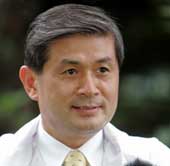 |
| Hwang: Flop hero |
Seoul, Jan. 9 (Reuters): There was a time when South Korea could not lavish enough awards, accolades and first-class tickets on its national hero scientist, but now sponsors are wondering what to do with items they gave to now disgraced Hwang Woo-suk.
A Seoul National University panel is tomorrow expected to release its final report on the veracity of three major claims by Hwang’s team ? developing tailored embryonic stem cells, producing the world’s first cloned dog and producing the first cloned human embryos for research.
The panel has already said there was no data to support the claims that Hwang’s team produced tailored embryonic stem cells as he had claimed in a heralded May 2005 paper.
Hwang’s fraud brought shame to South Korea, newspaper editorials said. Several sponsors said they were awaiting the final report before deciding whether to take back awards and gifts they gave to him.
Hwang will probably lose his title as the country’s first “supreme scientist” and the 3 billion won ($3.02 million) annual grant that came along with it, South Korean media cited government officials as saying last week.
The science and technology ministry gave Hwang the distinction in June 2005 with the promise of 3 to 5 billion won a year in subsidies for up to five years. Media reports quoted officials saying it was likely to rescind the title after the university panel’s final conclusions were released.
Hwang was once hailed in South Korea for taking the country to the forefront of stem cell and cloning research.
His image was used on government promotional material showing the country as a leading force in cutting edge technology. It gave tens of millions of dollars to fund his research.
Major South Korean companies such as steelmaker POSCO and Korean Air have yet to say whether they will continue their support for Hwang, but they will closely look at the final report.
POSCO pledged to give 1.5 billion won for Hwang's research and sponsored the chair for his professorship at Seoul National University. Hwang stepped down from that post last month.
”The support was intended for the development of Korea's science,” said spokesman Bae Hyo-seop.
Korean Air offered Hwang and his wife free first class tickets for the next 10 years and has yet to withdraw the offer, an official said.
Last month, media reported, police withdrew Hwang's bodyguards at his request.
At one point last year, South Korea's Foreign Ministry had planned to create a post equivalent to an“ambassador for science” to help Hwang in his work overseas, an official said.
About three months ago, amid much fanfare, South Korea opened its World Stem Cell Hub in the hope of building on Hwang's success and making the country a global centre for research.
The government has now cut most of its funding for the hub in next year's budget, the JoongAng Ilbo reported.
Seoul prosecutors will also be paying close attention to the final report. They have said they will decide after its release whether to investigate Hwang for criminal fraud. (With additional reporting by Lee Jin-joo)










